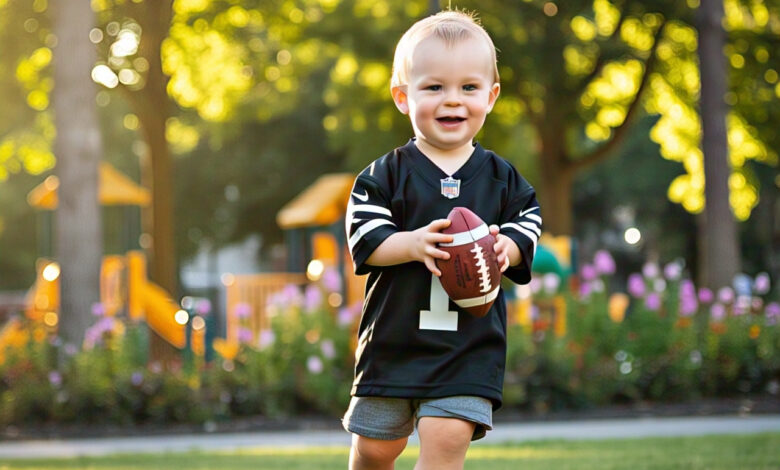Why Football Is the Perfect Sport for Toddlers

When it comes to choosing a sport for your toddler, the options can be overwhelming. From swimming to gymnastics, dance to martial arts, each activity offers unique benefits. However, one sport stands out for its simplicity, accessibility, and developmental value: football (also known as soccer in some countries). You might not picture a toddler kicking a ball with the finesse of a pro, but at their level, football is less about competition and more about movement, discovery, and fun.
Here’s why football is the perfect sport to introduce to toddlers, and how it supports growth far beyond the field.
1. Simple and Natural Movement
Football for toddlers involves one of the most instinctive actions for a young child—kicking. Give a toddler a ball, and their first instinct is often to chase it and try to kick it. Unlike sports that require advanced equipment or complex rules, football for toddlers starts with the basics: running, stopping, kicking, and laughing.
These natural movements are not just fun—they’re critical to early physical development. As toddlers learn to control their limbs and balance, football for toddlers provides an engaging and playful way to practice those skills. Whether they’re chasing a rolling ball or trying to stop it with their foot, they’re exercising core motor skills without even realizing it. Enrolling your child in a toddler football class can offer structured opportunities to develop these abilities in a safe, encouraging environment.
2. Supports Gross Motor Skill Development
Toddlers are in a stage of rapid motor development. Football engages large muscle groups through running, kicking, jumping, and turning. These movements improve balance, strengthen leg muscles, and boost overall body coordination.
Even basic drills like dribbling the ball around cones or kicking toward a small goal help build spatial awareness. And since toddlers tend to learn best through play, football provides an ideal setting for movement-based learning.
3. Encourages Social Interaction
Football is inherently social. Even in toddler-friendly versions of the game, children interact with others by passing the ball, taking turns, or simply running alongside teammates. These experiences are essential for learning cooperation, empathy, and sharing.
Team-based activities help toddlers understand concepts like waiting their turn, listening to instructions, and respecting others’ space. All of these are foundational skills for later school environments and daily life.
4. Builds Confidence and Self-Esteem
Every kick, goal, or successful pass becomes a mini achievement for toddlers. These accomplishments—no matter how small—build self-confidence and encourage persistence. Toddlers begin to associate effort with results, learning that trying leads to progress.
In a positive and supportive environment, football also teaches that making mistakes is part of learning. Falling down, missing the ball, or not scoring a goal becomes a chance to try again—not a reason to give up.
5. Encourages Active Lifestyles Early On
In today’s digital age, encouraging movement from an early age is more important than ever. Football offers a structured yet fun way to keep toddlers active. It gets them off screens and into open spaces where they can run freely, burn energy, and develop healthy physical habits.
Introducing football early on creates positive associations with exercise and outdoor play. These associations often stick, helping children stay active as they grow older.
6. Easy to Access and Affordable
Unlike many other organized sports, football doesn’t require expensive equipment or specialized facilities. All you need is a ball and a safe space to play—whether it’s a backyard, a park, or a local community center. This accessibility makes it ideal for families looking for budget-friendly options that still offer great developmental value.
There are also plenty of toddler football programs that use soft balls, age-appropriate goals, and fun games designed for young children. These programs usually focus more on movement and play than rules and competition.
7. Fosters Emotional Development
Football introduces toddlers to a variety of emotions—excitement, pride, frustration, joy—and provides a safe space to explore and express them. Learning to navigate these feelings helps toddlers build emotional intelligence.
For example, they may feel disappointed when they miss a goal or thrilled when they succeed. Guided by encouraging coaches and caregivers, toddlers begin to understand their emotional responses and learn how to handle them in healthy ways.
8. Parent-Toddler Bonding Opportunity
For toddlers, football can be a wonderful shared activity with parents or caregivers. Kicking the ball back and forth, practicing simple drills, or playing at the park offers valuable bonding time. These shared moments help strengthen emotional connections while giving parents insight into their child’s progress and interests.
Moreover, being present during your toddler’s football sessions provides reassurance and boosts their confidence to participate and explore.
Conclusion
Football is more than just a sport—it’s a tool for growth, connection, and joy. Its simplicity, accessibility, and rich developmental benefits make it an ideal choice for toddlers. From building coordination to encouraging teamwork and boosting confidence, football offers toddlers a fun, active way to learn about the world and themselves.
So, the next time you’re considering an activity for your little one, grab a ball and head outside. You might be surprised at how much they learn from such a simple game—and how much fun they have along the way.



